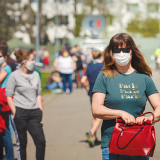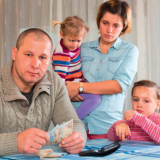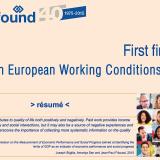EU context
Στις 26 Απριλίου 2017, η Επιτροπή παρουσίασε τον ευρωπαϊκό πυλώνα κοινωνικών δικαιωμάτων. Πρόκειται για μια δέσμη μέτρων που περιλαμβάνει μια πρωτοβουλία για τη στήριξη της ισορροπίας μεταξύ επαγγελματικής και προσωπικής ζωής για γονείς και για άτομα που παρέχουν φροντίδα. Η πρωτοβουλία αυτή έχει ως στόχο να αντιμετωπίσει την υποεκπροσώπηση των γυναικών στην αγορά εργασίας, ενώ ταυτόχρονα καθορίζει μια σειρά νέων ή βελτιωμένων ελάχιστων προτύπων για τη γονική άδεια, την άδεια πατρότητας και την άδεια φροντίδας.
Το έργο του Eurofound
Συλλογή δεδομένων
Οι Έρευνες του Eurofound για την Ποιότητα Ζωής στην Ευρώπη (EQLS) παρέχουν συγκρίσεις μεταξύ των χωρών, όσον αφορά τον συνδυασμό επαγγελματικής και οικογενειακής ζωής, τις ευέλικτες ρυθμίσεις χρόνου εργασίας, και την παροχή ποιοτικών υπηρεσιών φροντίδας. Οι Έρευνες για τις Ευρωπαϊκές Επιχειρήσεις (ECS) παρέχουν δεδομένα σχετικά με τους λόγους για τους οποίους οι εταιρείες χρησιμοποιούν ευρύ φάσμα ρυθμίσεων χρόνου εργασίας και τους τρόπους με τους οποίους τις χρησιμοποιούν. Οι Ευρωπαϊκές Έρευνες για τις Συνθήκες Εργασίας (EWCS) εξετάζουν την οργάνωση του χρόνου εργασίας σε ολόκληρη την ΕΕ, καθώς και σχετικά ζητήματα, τα οποία συμπεριλαμβάνουν τις ευέλικτες ρυθμίσεις, τις προτιμήσεις ως προς τον χρόνο εργασίας και την ισορροπία μεταξύ επαγγελματικής και προσωπικής ζωής.
Το Ευρωπαϊκό Παρατηρητήριο του Εργασιακού Βίου (EurWORK) παρέχει πληροφορίες για τις συνθήκες εργασίας και τη βιώσιμη εργασία, καθώς και βάση δεδομένων σχετικά με τις αποδοχές, τον χρόνο εργασίας και τις συλλογικές διαφορές. Επίσης, το Eurofound έχει εκτιμήσει το οικονομικό και κοινωνικό κόστος της διαφοράς μεταξύ των φύλων στην απασχόληση και μπορεί να προσφέρει πληροφορίες για τη δημιουργία θέσεων απασχόλησης στις υπηρεσίες φροντίδας.
Απεικόνιση δεδομένων
Εστίαση: Τεύχος του Foundation Focus με θέμα τις λύσεις για την ισορροπία μεταξύ επαγγελματικής και προσωπικής ζωής
23 Δεκεμβρίου 2016 - Αυτό το τεύχος του Foundation Focus εξετάζει την ισορροπία μεταξύ επαγγελματικής και προσωπικής ζωής και ορισμένους από τους παράγοντες που βοηθούν ή παρεμποδίζουν τους εργαζομένους να συνδυάσουν την επαγγελματική με την προσωπική τους ζωή. Δεδομένου ότι μειώνεται σταθερά ο μέσος όρος των ωρών εργασίας, στο τεύχος τίθεται το ερώτημα αν εξακολουθεί να έχει σημασία η ισορροπία μεταξύ επαγγελματικής και προσωπικής ζωής. Πώς μπορεί να βοηθήσει η οδηγία για τον χρόνο εργασίας και ποιος είναι ο ρόλος των πολιτικών σχετικά με τις ευέλικτες ρυθμίσεις του χρόνου εργασίας; Ποια συγκεκριμένα μέτρα στήριξης χρειάζονται για τα άτομα που έχουν την ευθύνη της φροντίδας παιδιών ή ενηλίκων; Η ισορροπία μεταξύ επαγγελματικής και προσωπικής ζωής συνδέεται και με άλλες πτυχές της ζωής, για παράδειγμα με την ανάγκη για υψηλής ποιότητας παιδική μέριμνα, την αντιμετώπιση της διαφοράς των φύλων στην απασχόληση και την πρόνοια για εργαζομένους μεγαλύτερης ηλικίας που δεν μπορούν να συνεχίσουν να εργάζονται υπό καθεστώς πλήρους απασχόλησης.
Ισορροπία μεταξύ επαγγελματικής και προσωπικής ζωής: δημιουργία λύσεων για όλους






















